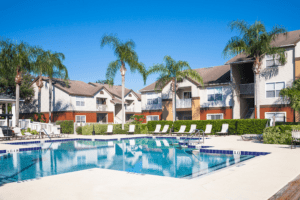
Rental property managers know that their jobs rely on a firm foundation of exceptional customer service. After 40 years in apartment management, Cathy Fontana has some words of wisdom for managers who are looking to create thriving communities and build relationships with satisfied and loyal residents.
Rental Property Managers’ 10 Essential Customer Service Commandments
Commandment 1: Practice Effective Communication
Communication is what makes every one of these commandments work well in practice. Ensure prompt and effective communication with residents through various channels like email, phone, or even a dedicated resident portal. Respond promptly to queries, concerns, and maintenance requests. Remember: consistency is the key to building trust and encouraging solutions instead of negative experiences.
Communication Tips for Active Listening
To implement active listening for better tenant communication, it is crucial for rental property managers to create a welcoming and judgment-free environment when engaging with tenants. Start by giving undivided attention to tenants during conversations, maintaining eye contact, and using positive body language to signal interest and attentiveness.
Encourage tenants to share their concerns or issues openly and be patient, allowing them to express their thoughts fully without interruption. Reflect back on what tenants have said, paraphrasing and summarizing their concerns to ensure understanding and show that their words are valued. Ask them if you understand their concerns correctly.
Practice empathy by acknowledging their emotions and validating their experiences. Ask open-ended questions to encourage tenants to delve deeper into their concerns and provide opportunities for them to propose possible solutions.
Commandment 2: Create a Welcoming Environment
Rental property managers and staff should always treat residents with respect and warmth, making them feel valued and appreciated. We all get busy and overstimulated from time to time working in the front office, but making the effort to show respect and consideration can go a long way toward heading off conflict and maintaining a positive reputation. Extend a personal touch by remembering residents’ names and stories when possible.
Tips for Creating a Welcoming Apartment Manager’s Office
The state of your office sends a message to tenants about your management abilities.
Start every conversation off right by ensuring a well-organized and inviting space:
- keep the office clutter-free
- maintain a neat and professional appearance
- provide comfortable seating
- display informational brochures about the property and neighboring amenities, as well as any upcoming community events
Friendly, knowledgeable staff should greet visitors with a warm smile, offering assistance and answering questions promptly. Establish open communication channels and actively listen to renters’ concerns, displaying empathy and a genuine desire to help. Additionally, adding small touches like fresh flowers, a well-stocked beverage station, and a welcoming reception area can go a long way in making visitors feel valued and at home.
Commandment 3: Be Proactive in Addressing Issues
Anticipate and address potential problems before they escalate. Great rental property managers conduct regular inspections, address maintenance issues promptly, and seek feedback to become aware of potential problems before they result in negative experiences for residents. Here’s a quick checklist you can use at least monthly to make sure you’re staying on top of any potential property issues.
Checklist of Regular Property Inspection and Maintenance Tasks
- Exterior Inspections: Perform regular inspections of the building’s exterior, including the roof, siding, windows, and balconies. Look for any signs of damage, such as leaks, cracks, or loose fixtures. Schedule repairs or maintenance as necessary to prevent further deterioration or potential safety hazards.
- Common Area Maintenance: Regularly inspect and maintain all common areas, such as hallways, stairwells, laundry rooms, parking lots, and community amenities. Check for cleanliness, lighting issues, faulty equipment, or any areas in need of repair. Promptly address any issues to ensure the safety and convenience of residents.
- HVAC Systems: Schedule routine inspections and maintenance for heating, ventilation, and air conditioning systems. Check filters, clean vents, and address any concerns related to temperature control or airflow. Properly functioning HVAC systems enhance tenant comfort and can prevent major breakdowns. You can even send out seasonal tips for using environmental controls efficiently; a monthly newsletter, text messaging, and even bulletin board posting are great ways to convey these helpful tidbits.
- Plumbing and Electrical Systems: Inspect all plumbing and electrical components regularly. Look for leaks, water pressure issues, faulty outlets, or flickering lights. Address these problems promptly to prevent costly repairs or potential hazards for tenants. Encourage residents to report any issues right away.
- Safety Measures: Conduct regular inspections of fire extinguishers, smoke detectors, emergency exits, and security devices. Test and ensure they are functioning correctly. Keep records of inspections to comply with safety regulations. If necessary, arrange for professional inspections from qualified technicians. We recommend working with your local emergency services, such as fire departments and police, to make sure you’ve addressed potential hazards through quarterly inspections and sharing safety tips with residents.
- Landscaping and Grounds Maintenance: Monitor the upkeep and appearance of the property’s landscaping, lawns, and outdoor common areas. Schedule regular inspections to identify and address any issues like overgrown vegetation, broken fences, inadequate lighting, or damage caused by harsh weather conditions or pests. Depending on your location and community engagement, you might also consider inviting local native plant organizations and schools to help design water-wise, beautiful planting areas and community gardens.
Commandment 4: Prioritize and Resolve Complaints Efficiently
Acknowledge resident complaints or concerns promptly, investigate the matter thoroughly, and take appropriate action to resolve them effectively. Keep residents informed about the progress or steps taken to address their concerns.
You’ve probably experienced the impact of negative public reviews on your property’s reputation. These can have long-lasting effects if they’re mishandled, so use this guide to responding to the negative online reviews you’ll likely face, even despite your best efforts at resolution.
Commandment 5: Encourage Tenant Use of Common Areas
Common areas like clubhouses, pools, and gyms contribute to a positive living experience, but only when residents use them regularly and consider them part of the value of monthly rent. The ambiance and comfort level of the common areas play a crucial role in encouraging residents to use them. Consider providing comfortable seating, adequate lighting, and vibrant decor that suits a variety of interests and preferences, and as always, keep common areas clean and in good repair.
Periodically, it pays to reflect on the preferences and interests of your residents and diversify the available amenities in your common areas. Conduct annual resident surveys and keep track of facility usage when you can, to inform decisions about offering the spaces and amenities residents want. Include spaces for recreation such as a game room, fitness center, yoga studio, outdoor barbecue or picnic area, or even a small library. Providing a range of options helps cater to different resident preferences and helps build a loyal and engaged community.
Commandment 6: Foster a Sense of Community
Organize community-building events, social activities, or resident meetings to create a sense of belonging. Regular community events encourage residents to interact and develop a friendly atmosphere within the community, and send the message that you understand their needs and want to make their life at your apartment community an enjoyable one.
Hosting social events and activities can help residents connect while simultaneously boosting the appeal of your common areas. Consider organizing events like wine and cheese tastings, game nights, yoga classes, or book clubs, and provide avenues for residents to propose and organize their own activities or gatherings within the common areas. Promote events through newsletters, flyers, social media platforms, bulletin boards, and text messages to increase awareness and participation.
“At one community I managed, we had lots of working families,” Fontana recalled. “We would organize a monthly ‘no-cook dinner’ and provide pizzas our residents could pick up as they got home from work.”
Although the event was come-and-go, Fontana said it was extremely popular and sent a message of thoughtfulness and caring. How could you organize helpful events like this one to support your residents?
Commandment 7: Offer Personalized Tenant Services
Go beyond basic amenities by offering sought-after services like 24-hour package delivery. Tailor your property’s unique service offerings to meet the needs of your resident community.
If you have a large work-from-home population, for instance, you might offer your property’s pool clubhouse as a co-working space during the day. Make sure it has plenty of electrical outlets, great wi-fi, and even include use of a printer and a green screen for virtual meetings.
Commandment 8: Be Transparent with Lease Terms
It’s not always possible to have flexible leasing agreements. When you can, accommodate residents’ requests for lease extensions or transfers, especially when faced with unforeseen circumstances. Show empathy toward their situations, but be firm and factual when referencing lease terms in the face of a possible violation. It’s only fair that everyone who lives at your property follows the same rules and understands them from the beginning.
Creating a transparent environment is crucial for maintaining positive communication and building trust with renters. It’s important to ensure that lease terms and their enforcement are conveyed clearly and consistently. Here’s a process that can help apartment managers achieve transparency while fostering good relationships with renters:
- Provide a clear and detailed lease agreement. Start by drafting a comprehensive lease agreement that covers all essential terms and conditions. Clearly outline rental rates, due dates, penalties, and any additional charges. Ensure the document is well-structured, legible, and easily understandable without legal jargon.
- Be clear with pre-lease communication. During initial interactions with potential renters, openly discuss lease terms, conditions, and expectations. Provide them with a copy of the lease agreement as early as possible so they can review and ask questions before committing. Be available to address any concerns and offer explanations to minimize confusion.
- Conduct a move-in orientation. Host a thorough move-in orientation session with new renters. Use this opportunity to walk them through important lease terms, such as maintenance procedures, pest control policies, common area rules, and emergency contact information. Emphasize that open communication is encouraged throughout their tenancy.
- Use written communication channels. Utilize written communication methods to ensure clarity, documentation, and easy reference. Consider using emails, newsletters, or a dedicated online tenant portal to share updates, reminders, or changes related to lease terms. Send periodic reminders for upcoming deadlines, inspections, or maintenance activities to keep renters informed.
- Host regular Q&A sessions. Organize regular question and answer sessions or town-hall-style meetings where renters can discuss any concerns related to lease terms or their enforcement. Allocate time during these sessions to address questions, clarify ambiguous points, and provide consistent explanations. Encourage renters to raise queries openly and respond considerately.
- Practice consistent and fair enforcement. To maintain transparency, take a consistent and fair approach when enforcing lease terms. Treat all renters equally and follow through consistently with penalties or charges when required. Document incidents and resolutions to avoid any misunderstandings or a perception of biased actions.
- Maintain an open-door policy. Create an atmosphere where renters feel comfortable approaching you with questions, concerns, or requests related to lease terms. Emphasize your open-door policy, allowing face-to-face discussions whenever possible. Being approachable fosters positive communication and ensures greater transparency.
- Encourage tenant feedback. Routinely ask renters for feedback on lease terms, enforcing policies, and their overall rental experience. Utilize surveys, suggestion boxes, or online feedback platforms to gather input anonymously. Act upon constructive feedback to constantly improve lease agreements and their implementation.
Remember, lease transparency is not a one-time effort but an ongoing commitment. Maintain open lines of communication, actively address concerns, and consistently enforce lease terms. By following this process, you can establish transparency while nurturing positive relationships with your renters, who will appreciate having established boundaries and expectations for themselves, their neighbors, and rental property managers and staff.
Commandment 9: Respect Privacy and Confidentiality
Ensure the privacy of residents by handling personal information securely and respecting their boundaries. Obtain consent before entering their unit, unless it is an emergency or for previously scheduled maintenance. Take care to protect personally identifying information from digital threats and prying eyes in your office, and even your office trash.
Commandment 10: Regularly Seek Resident Feedback
Encourage residents to provide feedback on their living experience, maintenance services, or amenities. Actively address the feedback by making necessary improvements, and inform residents about the changes made based on their suggestions.
To establish a regular cadence of tenant feedback, we recommend that rental property managers adopt a mix of any or all of the following standard communications. Use what works best for you! It might take time to find out how your residents prefer to get in touch. Add regular surveys to your list of feedback tools to keep your finger on the pulse of tenant satisfaction.
5 Top Tips for Creating Opportunities for Tenant Suggestions
- Resident Welcome Package: Prepare a comprehensive welcome package for new tenants, including information on building rules, emergency procedures, maintenance request protocols, and contact details for management and maintenance personnel. Providing this information up front can help residents understand who to contact when they have questions or concerns.
- Regular Newsletters or Notices: Send regular newsletters or notices to all tenants, keeping them informed about upcoming maintenance or repairs, changes in building policies, or any community events. Establishing clear and effective communication channels fosters a sense of community and ensures tenants are aware of any potential disruptions. Ask for feedback or questions through a specific channel, like email or phone, in the footer of every newsletter or flyer.
- Maintenance Request Protocols: Clearly communicate the preferred method for residents to submit maintenance requests, whether it’s through an online portal, email, or phone call. Provide guidelines on response times and follow-up procedures for different types of maintenance issues. You can include this information in the resident portal, bulletin board, and your regular community newsletter.
- Scheduled Maintenance Windows: Inform residents in advance about upcoming maintenance or repair work that may affect their daily routines, such as water shut-offs, landscaping projects, or elevator maintenance. Provide estimated timings and explain the reasons behind these actions to minimize inconvenience. Request that residents contact the office with any questions or scheduling concerns.
- Regular Inspections: Schedule periodic inspections of individual units to check for any maintenance or safety issues. Communicate these inspections well in advance, explaining the purpose and addressing any concerns regarding privacy. After the inspection, send out a survey asking for feedback on the residents’ experience.
Successful Rental Property Managers Develop These Skills, and More
Above all other priorities, keep the flow of communication open between management and residents to maintain an open-door policy, and keep it positive. That’s why communication is the number one commandment, and should always be the top priority of rental property managers.
When you are transparent about expectations and provide opportunities for residents to express their preferences and concerns, you’ll set a foundation for trust and mutual respect. Those two factors, along with considerate and consistent customer service, create highly sought-after living communities that offer both residents and rental property managers a place they’re proud to call home.





